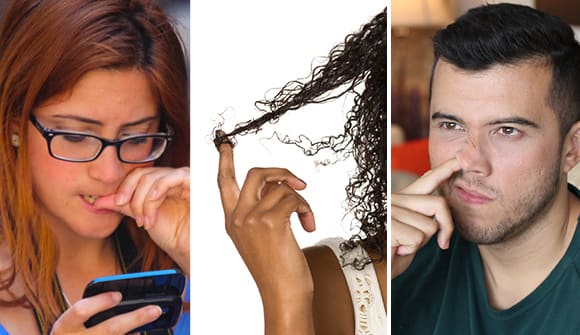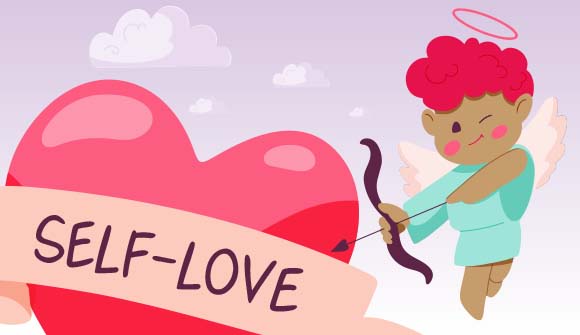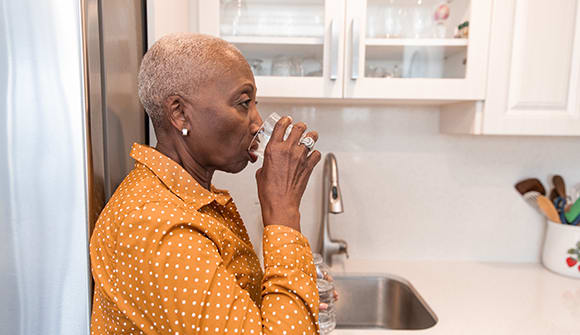Breaking bad habits
Playful pattern or anxious action?
Article Author: Katie McPherson
Article Date:

Nail biting. Skin picking. Knuckle cracking. Hair twirling. Nose picking.
Maybe you have a “bad” habit or two, or you’ve been around a colleague, friend or family member and noticed theirs. Whether they make you self-conscious, gross you out, or just plain irritate you, it turns out most bad habits are just red flags that warn of something more.
Sarah Robinson, PhD, psychologist and board-certified behavior analyst at Baptist Behavioral Health, said bad habits often arise when you’re feeling stressed.
“A lot of people have something they do often — twirling hair, biting nails, picking skin, all kinds of things,” she said. “Sometimes these actions feel calming and people do them more frequently when they’re anxious, as a way to self-soothe. Other times, people do these habits when they are bored. Sometimes we’ll see habits arise when there's not something occupying a person’s hands or mind, like when he or she is waiting for a meeting to start. In those cases, the action is less related to anxiety.”
When you think of these so-called "bad habits" as boredom busters or ways to cope with feelings of anxiousness, are they really that bad? Well, there is such a thing as a bad habit, Dr. Robinson explained.
“Habits are bad if they cause harm. When people decide they want to change these things, it’s usually because they’ve picked at their skin and have sores, or twirled their hair so much they actually begin to pull it out. We get concerned about habits when they cause someone harm or make him or her stand out and in a way that is not socially acceptable,” said Dr. Robinson.
If you have habits you’d like to change — whether they’re harmful to you or just something you wish you didn’t do so often — there are easy ways to start. Dr. Robinson said habit reversal training is something most people can accomplish at home.
1. Practice being aware of the habit.
“Make note when you do the habit or are about to do it. Get more aware so it’s not automatic,” said Dr. Robinson. “One thing you can do is keep a log and write down every time it happens. Then you may notice some patterns, like if you do your habit during certain times of day or during certain activities. Enlist another person to help you if you don’t notice yourself doing it.”
2. Replace the habit with something else.
“Once you are aware of your habit and when you tend to do it, you can come up with a competing behavior. Find something else to do instead of the habit and work on maintaining that,” she said. “If you bite your nails, you can put your hands under your legs while you’re sitting. When you feel the urge to do your habit, do the other behavior until that urge goes away.”
3. Stick to it.
“You need to stick with it and have motivation,” Dr. Robinson explained. “Enlisting another person is helpful because he or she can give encouragement and help you be accountable. It can also help to reward yourself. Maybe you say, ‘If my nails get better, I’ll go and get a manicure. If I can stop pulling my hair, I’ll go get a new hairstyle.’ Building these things in can motivate you to get better about your habits. Remember that changing habits is hard. You have to keep doing something for several weeks before you can break a bad habit or establish a new one.
While all these steps can be taken at home, you can also reach out to a licensed psychologist or counselor for support if you can’t seem to kick your habit.
“If a person is working on something on his or her own and they’re not making progress, or if it’s a habit that really causes damage to a person, it may be time to seek professional help,” Dr. Robinson said.
If you have a bad habit that you just can’t break, or one that involves physical harm, Baptist Behavioral Health is here to help. Call 904.376.3800 to speak with a patient coordinator who can match you with the right provider for you.



